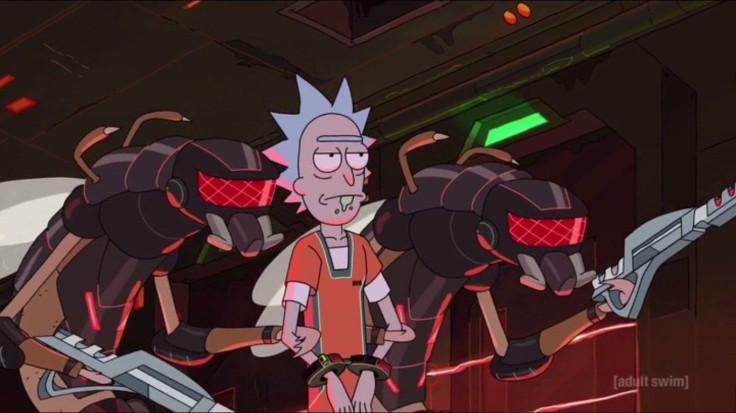We all have our methods (alcohol) for coping with the interminable wait between the end of Rick and Morty Season 2 and the premiere of Season 3. For many Rick and Morty fans of the more keyboard-bound persuasion, the main coping method has been increasingly elaborate fan theories.
A quick perusal of the Rick and Morty subreddit gives us some of the genre staples:
*Bring up utterly trivial narrative conceit, one-off joke, or visual gag*, “ Could this Rick have been from a different reality?”
*Pull together a thousand micron-thin threads to create a single, very nearly plausible conjecture* “Here’s what Rick’s wife, who we’ve never seen, is like and how they broke up.”
*Note a character or character’s outlandish power or quirky ability* “Does this mean alt-reality Krombopulos Michael will be the one to bust Rick out of galactic prison?”
Like any nerd discussion, the fan theory can become the center of gladiatorial debate, where the ones with the most arcane and comprehensive trivia win. Fan theories reward close attention, since they often rely on building new narrative connective tissue in the tiniest cracks. And probably, somehow, people find them fun (to each their own). But here’s the bad news: your fan theories are spectacularly unlikely to be true.
Despite being fan theories — the most trivial of all theory forms — Rick and Morty fan theories have achieved an astounding level of baroque complexity, like a cathedral built of episode GIFs and Mountain Dew farts. One of the most widely spread of these theories (including a post on the Rick and Morty Facebook page ) is “The Secret of the Ticket”:
Setting aside some physics nitpicks, the theory is pretty sound and boils down to two basic conclusions:
Many of the episodes may not feature C-137 (the show’s “home” slice of the multiverse) Rick and Morty , but an alternate dimension version of the characters.
Krombopulos Michael could return to rescue Rick from Galactic Federation prison because he wasn’t killed in C-137.
The math checks out, but that doesn’t really matter to whether this will ever actually prove true in the show’s continuity. Why? Because Dan Harmon and Justin Roiland, the show’s co-creators, would never use the inconsequential and trivial — the basis of most fan theories — as a foundation for the main narrative. Never ever. They just won’t. Here’s Dan Harmon explaining why to AV Club:
“I think that’s a really remarkable thing about today’s TV audience. You cannot write payoff-based TV anymore because the audience is essentially a render farm. They have an unlimited calculation capacity. There’s no writers’ room that can think more than 20 million people who can think about it for an hour a day. That season of Dexter being the big example: They had planned out this whole Fight Club reveal that there was a character that didn’t really exist except in someone else’s head. They’d planned out the whole clever thing, and they were going to reveal it, and all this stuff, and then after episode one aired, somebody on Reddit just like, [Snaps fingers.]. You can’t do it anymore. You can’t try to fool the audience.”
It’s precisely because of the fan theorists indefatigable drive to peek under every rock and examine every detail that Rick and Morty writers would never try and outsmart them with a too-clever twist or explanation.
Not only that, but it’s just bad for character. The just-so, arithmetical nature of fan theories — which rely on precise readings of individual lines or images to imply major narrative consequences — is typically antithetical to the kind of character richness and human ambiguity that drives actual narrative drama.
“That’s why we’re very careful about delving into Rick’s backstory, because when we do, we don’t want there to be any shocking surprises,” Harmon said in the same interview. “Justin was really smart about that, saying, ‘No, we don’t want to reveal that Rick started drinking when blah blah blah,’ because then there’s something very shark-jump-y about that, like where you learn that the Fonz didn’t always wear leather jackets. Because people aren’t like that.”
Roiland agreed, calling that variety of storytelling “George Lucas-y.”
Just because the elaborate fan theories spun online about Rick and Morty are unlikely to carry over into Season 3 episodes doesn’t mean they’re not worthwhile. Or maybe it does, who cares. The point is, Harmon and Roiland don’t see their jobs as storytellers in the same way that fan theorists do. “The really cool thing is that render farm reduces your job as a writer to story and jokes. Character. Just things that in the moment that you provide for them, it’s like you’re spinning plates or juggling,” Harmon said.
It seems most fan theories are, as Roiland told the AV Club, “People giving us way more credit.”
Harmon agreed. “Oh yeah. Yeah, that happens all the time.”















![[EG April 19] Best 'Stardew Valley' Mods That Will Change](https://d.player.one/en/full/226012/eg-april-19-best-stardew-valley-mods-that-will-change.png?w=380&h=275&f=955520b8313253ee3c39c791f6210f38)



